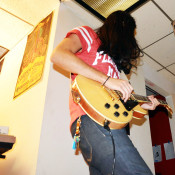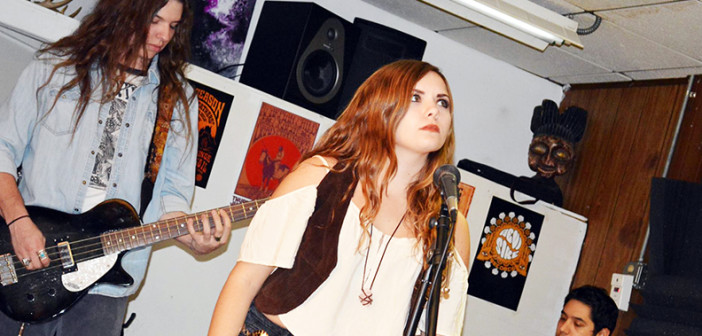Framed by an American flag, she stares in the mirror. A nude painting hangs behind her.
“I’m almost always in costume,” she says, breaking her gaze and pacing down the polished apartment floor.
She passes frames of The Black Angels and The Beatles, a meticulously ordered vinyl collection, Native American dream-catchers, hidden notes from her love, and a calendar that reads “STONER ROCK BBQ IN INDY” for the coming Saturday.
The tattered door wrenches open. She skips downstairs, bounding over a hole where the last stair should be. She grabs a tambourine off the floor and blows dust off its cover.
 Marissa Allen is in a vintage psychedelic rage.
Marissa Allen is in a vintage psychedelic rage.
Her bandmates distribute imported beer and adjust the amps. The first floor is dilapidated, abandoned and industrial. Seats ripped from vans are littered against the wall. It’s the practice space of the neo-psych band Dead Feathers.
The bass sets a rhythm, and we’re ripped into the hallucinatory groove.
“To the west we go…It’s the only way we know,” she sings, dipping her head to the scarred floor.
Her howl would be mournful if it wasn’t for the flickering edge, the vibe that spikes the tip of every decibel. The house bulges from the heat radiating from the Dead Feathers. For Marissa, it’s blues with a stain of violence, indignation with a fistful of embers.
She lifts the tambourine like a halo, pirouetting across the floor, each step spider-webbing cracks across pavement. Her Freak Power clothing flows to her whim. A flower child of the ghetto, she sings with the anthem, the force of hippie majesty, hints of her operatic training, her musical theatre mastery, and her southern flavor bleeding into the mic.
The tempo builds — the drummer sweating, the cheap beer rippling, the exposed pipes warping hysterically. A naked octopus goddess looms from a poster above.
“They think I’m a freak,” she says of her college classmates.
The riff breaks. The beat halts. The adopted cat, Marmalade Pancakes, pokes her head from a dark corner. Are they finished?
Marissa throws back her curls and lets out a rebel yell — no, a barbaric yawp.
The howl sends shivers through the house, cracking bits of paint from the floor, rattling exposed wires, sheering pipes and burning bowls of incense, stripping the place and casting off any guise of veneer. She cuts down, down to the flesh of the house, the cheap-rent ruins that pre-date the 20th century. It’s a painful thing.
The stab of her cry is too much for the papered windows and they soon tear, losing her voice into the far West Chicago midnight. The sound reverberates the chilled abyss. It rushes like an open wound, filling the cash loan shops, the broken fences, the burnt Christmas lights of dilapidated pawn shops, the miles of brick that squeal and shrink into oblivion.
It hits the cracked street, patrolled each night by a man dressed in blood-red. It rattles a shrill falsetto through the nearby shop. It winds down the alley, churning puddles at the feet of a pissing vagrant. It finds the decayed, the forgotten, the forsaken tribes and the charred dreamscape of 1970s America, those forgotten by most — except for she. She is the Freak’s dying breath. She is the daughter of the power movement, not born into it, but chosen.
Her rage finds all things neglected, tears their disguise and gives them a voice — and if not a voice, a howl of dark beauty. She is the psychedelic death to all we’ve built.
These things — the west-side rot, the injustice of life-long rejection, the ashes of promised romance and the liberation of love in a beat-down, windowless home. All these things are just tinder to her rage. She is a terrible fire in this urban wild.

